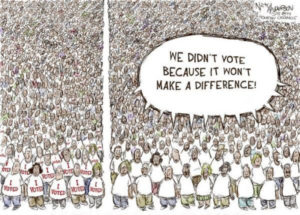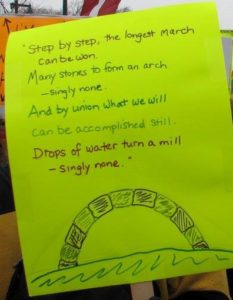 If you, or someone you know, is wondering “Why should I bother to vote today?” my current answer isn’t about the vast sweeping changes across the nation in the past two years and the fate of our democracy. My current answer is this:
If you, or someone you know, is wondering “Why should I bother to vote today?” my current answer isn’t about the vast sweeping changes across the nation in the past two years and the fate of our democracy. My current answer is this:
Vote today to compensate for those across the country whose votes are being suppressed, some perhaps as “unintended consequences” of apparently well-meaning changes* and some as blatant disenfranchisement:
– For example, in North Dakota, where the Supreme Court** just upheld a Voter ID law that requires a street address in order to vote, and where it is completely standard for the government not to issue street addresses on Native American reservations whose streets often don’t have names or numbers.
– Or in North Carolina, where five years ago — in fact, the very day after the Supreme Court gutted the Voting Rights Act*** (see p. 10 of the 2016 decision linked in this paragraph) — the state eliminated same-day voter registration and reduced both early voting and Sunday voting, explicitly because counties with strong Sunday voting tended to be “disproportionately” African-Americans who tended to vote Democratic. The law was overturned in 2016, but the justification went viral a few weeks ago.
– Or in Dodge City, Kansas, where the distribution of erroneous polling place information was only adding insult to injury. The notices said that voting would occur at the standard sole polling place in the center of town, but in fact they had already made the actual polling place get out of Dodge. The only place today for the primarily Latin@ city residents to vote is outside of town, 1 mile from the nearest bus stop.
– Or in Georgia, where, among other things, people’s addresses were purged from voter rolls based on when they last voted, and they were not notified. There are also problems with voting machines, absentee ballots, and processing registrations. Also, there are many fewer polling places across the state, something that has been growing since, hm…the 2013 gutting of the Voting Rights Act.
Some other good reasons to vote:
1) Demographics. Politicians pay attention to who votes in elections, and if you’re part of a demographic that polls as low turnout, the representatives may decide that your issues aren’t the ones to focus on.
2) History. No matter who you are, many of your ancestors have been legally unable to vote in this country. For those who struggled, fought, died, were imprisoned and force-fed, or marched and endured, your use of your vote now can honor their courage.
3) Meanness vs. civility. The vast sweeping changes across the nation in the past two years and the state of our democracy. The fate of America and all the people in it.
4) In case anyone thinks one vote doesn’t make a big enough difference****, I will simply copy some lyrics here from an earlier post:
Step by Step

sign for 2017 women’s march
Step by step, the longest march can be won, can be won.
Many stones to form an arch, singly none, singly none,
And by union what we will can be accomplished still;
Drops of water turn a mill, singly none, singly none.
As far as I know, the words are from the preamble to the constitution of the United Mine Workers (UMWA), and it was set to music by Pete Seeger. I learned it from Sweet Honey, and I found performances of them both:
Video (Sweet Honey in the Rock): https://www.youtube.com/watch?v=NXwM3pJFqAc
Recording and lyrics (Pete Seeger): https://genius.com/Pete-seeger-step-by-step-lyrics
——–
*There’s a Reuters quote in the Snopes article (cited later in the post) that says,
“Republicans have said laws like the one in North Carolina are needed to prevent voter fraud. Democrats have said such laws are voter suppression measures intended to make it harder for groups that tend to back Democratic candidates, including black and Hispanic voters, to cast ballots.”
I think this is a problematically complex answer.
My answer would be:
Voter suppression IS voter fraud. Go ahead and prevent that.
And further:
Is fraud prevention worth it if one person is prevented from voting as a result? Ten? 100? How many of your own friends’ or family’s votes would you trade for the “prevention of voter fraud”?
**with Gorsuch, without Kavanaugh, despite my previous belief. The majority included Sonia Sotomayor, however, which surprises me.
***Apparently SCOTUS felt that the southern states in question had been behaving well enough that there was no longer a need to require federal oversight of new changes in voting law. Within a day, as I recall, there were six new changes in voting law among the previously constrained states.
****Also, there is somewhere a list of major historical decisions decided by very few votes. I’ll try to find it. I mean, besides the 2016 Presidential. Oh, here’s one.